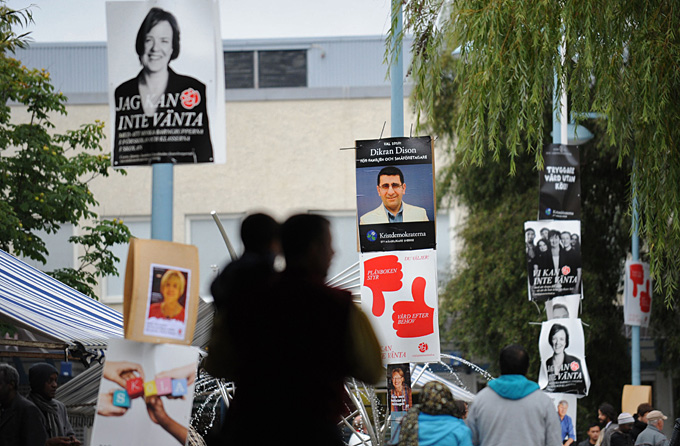Far-right gains jolt Sweden
The election of a far-right party into Sweden’s parliament shakes the country’s political landscape.

 |
| many Swedes have expressed disappointment with the election results [AFP] |
An anti-immigration party in Sweden has won seats in parliament for the first time, in the latest sign that far-right parties are gaining ground in Europe.
The Sweden Democrats (SD), which has described growth of the country’s Muslim minority as the biggest foreign threat since the Second World War, won 20 seats in Sunday’s parliamentary elections, leaving the two main blocs without a majority.
| Poll Results | |||||||||||||||
|
The centre-right governing coalition, which won 49.3 per cent of the vote, has ruled out any negotiations with the far-right group, and said it would instead look to the Green Party for support.
“I have been clear … We will not co-operate with or be made dependent on the Sweden Democrats,” Fredrik Reinfeldt, the prime minister and leader of the Moderate Party, said after falling just three seats short of a majority.
But the leaders of the Green Party, which scored its best election result ever, appeared hesitant to a partnership with the centre-right.
“The mandate we’ve got from voters doesn’t allow us to become a support party for a government with a climate policy which makes the climate goals unreachable for another 200 years,” Maria Wetterstrand, co-chair of the Green Party, told a news conference on Monday.
“No one from the [centre-right] Alliance has been in touch with us, neither now or earlier,” Peter Eriksson, the other co-chair, said.
The Social Democrats, which for the first time had created a coalition with the Green and Left parties to increase its chances of winning power, suffered a historic loss, winning just 30.9 per cent of the vote, down from 35.3 per cent in 2006.
Critics protesting
Many Swedes expressed disappointment that the Sweden Democrats won seats in the legislature. More than 6,000 protesters gathered in central Stockholm on Monday. Thousands of others, dressed in black clothes as an expression of mourning, marched in silence in Gothenburg.
The SD, which has been celebrating its historic entry into parliament, has dismissed fears that the party could cause legislative chaos.
“We won’t cause problems. We will take responsibility. That is my promise to the Swedish people,” Jimmie Akesson, the party’s 31-year-old leader, said.
The SD has campaigned on warnings of an Islamic “growing influence” in the country. Kent Ekeroth, its international secretary, said ethnic Swedes could become “second-class citizens”.
The party says immigration is draining the welfare system and wants to cut asylum and immigration by relatives of people already living in Sweden by 90 per cent.
Immigrants make up 14 per cent of the country’s population of 9.4 million. The largest groups of non-European immigrants in the last decade have been Iraqis and Somalis.
|
Al Jazeera’s Laurence Lee reports from Stockholm a day after the elections |
The rise of the far-right in Sweden is the latest sign that anti-immigration sentiments appear to be growing across Europe.
In the Netherlands, the anti-immigration Freedom Party, which wants to ban the Quran and shut down Islamic schools, made big gains during the June elections.
Hungary’s far-right Jobbik party, which campaigned on anti-Semitism and anti-Roma sentiment, also entered parliament for the first time in April elections.
The French government has made headlines by launching a crackdown on Roma immigrants living in camps, while the parliament has voted in a bill that would ban face-covering veils in public.
Italy’s Northern League party, which is part of the coalition government, has also made strong gains in recent elections. Berlusconi’s government has passed tough laws allowing authorities to fine and imprison illegal immigrants.
Matthew Goodwin, a lecturer in politics at the University of Nottingham, Britain, told Al Jazeera the success of the SD “does reflect a broader trend both in Western – and increasingly Eastern Europe”.
“Sweden historically did not have a successful ring-wing party,” he said.
“Initially, the far-right campaigned very hard on the claim that immigrants and other minority groups were taking jobs and social housing.
“But what we have seen over the last 20 years is a shift in the discourse of the far-right, really moving towards Islamophobia.”